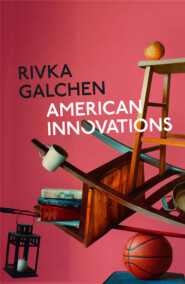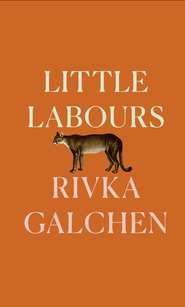По всем вопросам обращайтесь на: info@litportal.ru
(©) 2003-2024.
✖
Atmospheric Disturbances
Настройки чтения
Размер шрифта
Высота строк
Поля
Did I think I’d ever partner with Harvey in order to find Rema, rather than partner with Rema in order to control and deceive Harvey? I did not.
f. An unusual initiation of a kind of friendship with Tzvi Gal-Chen
Relaying Dr. Gal-Chen’s instructions to Harvey became easy, ordinary, domestic. The phone would ring, Rema would often recite a grocery list, and I would tell Harvey that Dr. Gal-Chen says high-pressure systems are coming in from the north and Harvey’s assistance is needed locally.
And following the initiation of the Gal-Chen therapy, for the next nineteen months, Harvey didn’t go missing even once. He followed strictly Tzvi Gal-Chen’s orders to stay for work in the city. He deregulated tidal winds off the Hudson River estuary; he finely negotiated the chaos of an incoming tropical storm system from the corner of his own street. As for me, Harvey’s mother regularly sent me grids of artisanal chocolates, each chocolate with its own transfer textile type pattern atop—and, well, this made me feel good about myself.
Rema also was very pleased—probably more pleased than me—with the success of the Tzvi Gal-Chen therapy. At least in the beginning, at least for a little while. She took to calling herself Dr. Rema, and she often held my hand and pressed the back of it against her cheek. Once, when the weather report interrupted the news, she squeezed my arm and leaned over and kissed me and laughed. She was the kind of happy that made me feel that she would love me, and me alone, forever. But maybe it was just that successful deceptions made her euphoric. “Why,” I asked her one evening, “did you say the corner store was out of clementines when in fact it wasn’t?” In response, she eyed me suspiciously. “I found the receipt for that blue sweater you bought me,” I said, “and you understated its price by eighty dollars.” She ignored me, remained unaffected in her bout of cheer. It was nice, though; contrary to my nature as it was, happiness grew in me.
Gal-Chen therapy language made its way into our apartment, first teasingly, but after a while who could say? When Rema and I disagreed, I’d invoke our meteorologist: “Dr. Gal-Chen prefers the green wool,” “Dr. Gal-Chen says no to imitation Nilla Wafers.” Or sometimes, more intimately: “Tzvi wouldn’t be pleased about your not wearing socks,” “Tzvi thinks you should return the movie,” or “Tzvi thinks you should plump a little.” Rema may have tired of this, but, after all, the specter of Tzvi had entered into our lives on account of her therapeutic invention, not mine. I thought of Tzvi as a stranger, certainly, but one whom I felt in some way shared our life, as if he returned to the apartment late, after Rema and I were asleep, and snacked on leftovers from the refrigerator, watched the television with the volume down low, left tea mugs in the sink.
One free afternoon, I came across a photo on the Internet of Dr. Gal-Chen with his family; I e-mailed it to Rema. She printed it on a color printer at the hospital, brought it home carefully tucked inside an empty patient folder, and then magneted it onto our refrigerator.
“That was nice of you,” I said.
“Oh, I just did it for myself,” she responded, maybe a tiny bit irritated.
I recall, at the time, having had certain interpretations of this action, this posting of a family photo on the refrigerator. But in retrospect, with all that has since happened, those interpretations now seem too simple. I admit that I had rather unsophisticatedly read the photo in our home as symptomatic of a longing for children, though I wasn’t certain if the longing was Rema’s or my own. Or if really the longing was just for a return to Rema’s own unremarked-upon childhood, or to an alternate of her own childhood. Or maybe the longing was for something else, for someone else. But whatever that photo was, I don’t care, it doesn’t really matter, it was also, and above all, just an amusing photo to look at when one went, from hunger, to let the yellow light and cold out of the refrigerator.
The butterfly collar and tinted glasses on Tzvi, the eyeleted cap sleeve with trim on his wife, that stolid Izod polo on the son—it was pleasing to travel back in time like that, falling through those mode details. And that little Bavarian mock-up on that tidy little chub of a child, well, that was just precious. “Why do you only notice clothing?” Rema asked, as if pointing to a moral flaw.
But when I pushed her as to what she noticed, she could only point out the creamy crooks of the elbows on the mother and son. Sometimes I wondered at the necklace on the wife, other times at the inscrutable pale blue square on the shirt of Tzvi Gal-Chen. And once Rema and I had a long argument about whether Dr. Gal-Chen’s shirt showed a button or a snap. I argued snap quite heatedly, on the basis of context. She argued button on the basis of visual details that I apparently couldn’t see. But look at the way the light catches on that snap—it’s pearline.
It was strange, now that I think about it, how I never tired of that photo.
Even though I know better than to trust appearances, especially posed, studio-airbrushed, heathered-backdrop appearances, still: the Gal-Chens had the look of a happy family. Maybe not particularly sophisticated, or good-looking, or fashionable, but still, happy. Even now I do not know if that was, or is, true or not. If they were, indeed, happy. But who can ever really know about anyone’s happiness, even one’s own? And if another woman can have the appearance of Rema, then perhaps I should by now be giving up on appearances entirely. But with that photo it was more than just an appearance, it was also a feeling, a family feeling. A feeling that at least seemed to be responding to something beyond mere appearance, though at times such “feelings”—such limbic system instinctual responses—are the most superficial and anachronistic of all, like the feeling a baby duck must have when it responds more strongly to a stick painted red than to the beak of its own mother.
4. A mysterious knuckle
So that was the state of affairs with Harvey—he was again missing—but I did not immediately connect his most recent disappearance (or Tzvi Gal-Chen) with Rema’s replacement, even though I had (as if a part of me knew something another part did not) immediately expected to find Harvey when I was paged shortly after the simulacrum had fallen asleep. When I returned from the hospital where Harvey wasn’t to the apartment where Rema wasn’t, I put Rema’s pale blue shoulder bag underneath the sink, for safekeeping. It was 5 a.m. and my new houseguest was not yet awake. She was hidden beneath Rema’s ugly old yellow quilt, with only one indefinite tan arm and a few tickles of blonde hair showing. I pulled the quilt back a bit; she didn’t stir.
It was a little uncanny, the feeling I had, looking at that look-alike. I was reminded of how I used to feel before I actually knew Rema, reminded of the winter when she was still a stranger and I would notice her, nightly, coming to the Hungarian Pastry Shop, wearing nubbly red mittens and her same wool coat with oversized buttons. She always ordered the loose-leaf teas, and when she would sit at a table near mine I liked to watch her try to pour from the little metal teapot without spilling, which wasn’t easy, since at almost any angle the water’s path of choice was to travel retrograde along the outside of the spout and spill on the table. Rema would then pat the table dry with her napkin and then get up and get more napkins, and this was every time, as if she couldn’t have anticipated and stocked up on extra napkins from the beginning. This—and her cornsilk hair, and her slightly clumsy gait, and I don’t know what—I loved her already then.
Leaving the sleeping simulacrum to herself I lay myself down on the sofa, experiencing the unhappy déjà vu of having lain myself down in just the same way not so many hours earlier, expecting Rema’s imminent arrival. I tried to rest. But although the phone did not ring—it was always ringing of late—intrusive thoughts, rising as if carbonated, disturbed me from sleep:
a movie dimly recalled from childhood, with a blind samurai who can’t see that the man pursuing him is his double
John Donne meeting his wife’s doppelganger in Paris, and this portending his baby’s death
Maupassant seeing his own doppelganger, and it portending his own death
Rema asleep on my shoulder at the movies
a guff of ugly laughter
This is just a problem I’m trying to depersonalize, I told myself. Probably just some very normal problem dressed up as a strange one. An ordinary problem masquerading as extraordinary. My mother used to say that almost any problem could be solved by one of the following three solutions: a warm bath, a hot drink, or what she called “going to the bathroom,” though she never specified what was to be done there. I was thinking now how I can’t really recall any episode from my childhood when her advice didn’t work. Our bathtub was in the middle of our kitchen, and the bathroom was a thin-walled room just on the other side of the kitchen sink; both rooms had the same houndstooth hand-layed tile floor, and one always heard water coursing through pipes, or braking, or boiling.
The sound of something like Rema walking by woke me from what couldn’t have been much more than an hour of sleep, but an awkward hour, from which I woke—starbursting pain—with a numb and tingly left hand. After again catching sight of the decidedly not Rema’s face, and during the achingly familiar sock- footing about in the kitchen that followed, I decided that I couldn’t just wait around feigning normality; I had to go and search for the real Rema. And though I didn’t know quite what that meant—would I don a cap, grab a magnifying glass, and go dusting for fingerprints?—I knew it was the proper next step to take.
Over red zinger tea with honey, I told the ersatz Rema of my plans. Or, at least, I mentioned to her that I thought I’d spend the day—which I could see out the window was another very gray, precipitous day—out walking.
“A walk sounds nice,” she responded expectantly, looking across the table at me with her dove dark eyes. “That sounds,” she continued, “like exactly what would please me. You and me and the gentle dog and we’ll—”
“I’d rather walk alone,” I braved.
“Oh.” The dog lover frowned. The red zinger had stained her lips a pretty pink. “I only offered to join you to be kind. But really the weather is ugly. What does the weatherman call this? Wintry mix? That makes it sound like dried cherries and coconut and pecans. But actually it is not so nice like that at all.”
As she spoke I was staring at her hands, both wrapped around her tea mug, staring at the little elephant-knee patterns of lines at the finger joints. I could see the divot in the knucklebone, the grooves that reveal the finger as but a line-and-pulley system. The longer I stared at that knuckle the more it grew foreign rather than familiar. Pretty hands. Pretty knuckles. Pretty little way of holding a tea mug.
“Wintry mix,” I finally said, slowly, copying the woman’s copied language. My tea had meanwhile grown cold. When red zinger gets cold it tastes too full of tannins and makes me more rather than less thirsty. “That is kind of a euphemism, isn’t it?” I agreed, trying to sound chummy and casual. But I couldn’t make eye contact with the impostress. It was as if, by not admitting that I planned to go out in search of Rema, I was cheating on her, on this alternate Rema.
“Where,” I tried, “is the puppy?”
“Bedroom,” she said. “You were sleeping.” And she got up from the table not aglow with happiness, not placated at all, in fact perhaps rather irritated. “And she’s not a puppy. She’s a dog. She’s an adult. In a new and stressful situation and so especially in need of love and attention,” she concluded, beginning to walk away from me.
“Why did you bring her home?” I called out with a desperation I didn’t expect.
“Why did you not bring her home?” she said. “Why do you not do anything at all?” she continued, not looking at me, and almost out of the room.
She was wearing Rema’s green nightie boxers. Her legs were pretty, a faintest blue. And also they were long, with one hip ever so slightly rotated inward. Like Rema. I was proud of myself for having had the strength of character to leave behind such an attractive woman. I wish Rema could have witnessed that. I just would have liked her to enjoy the spectacle of how obviously and entirely and singularly I loved her.
5. An initial search
How did I search the city for Rema? I found myself standing in front of the Hungarian Pastry Shop, in front of its fogged windows into which no child had yet traced patterns. Below the windows: the pastel mural of slightly deformed angels. To the left: stacked white plastic chairs. To the right: a man descending into the sidewalk cellar holding a tray of uncooked dumplings, the wrappings pinched and pointing to the sky. And, still standing outside, reflected in the glass, was—and for a moment I didn’t recognize him—me: hairy handed and slope shouldered and not as tall as I like to think I am. With a rising sense of ridiculousness, the thought surfaced: this is how I search for my wife? This was probably the one place she almost certainly would not turn up. Like the most gumshoe of all gumshoes, I’d gone where I wanted her to be, not where there was any reason or unreason for me to believe she actually would be.
I went inside anyway—it was warm and humid, like a room for leavening. Near the pastry display case, a young boy was patting at the pocket of his mother’s (I assume his mother’s) coat shouting biscotto! biscotto! A skinny vulture of a man—he had terrible eyebrows—watched from the table; he was a regular who typed pompously, and flirted with the waitstaff, and I’d once overheard him say he was into meditation, and I thought of him like a disease. A little farther back I saw the crowd I thought of as “the dirty kids”: two messy girls who seemed always to have just left a medieval fair—eternally in old velvet or silk or lace—and a young man, with unwashed hair and a small cartoon bear nose, who perpetually wore a shapeless too-short leather jacket. He looked sad that day; the girls were consoling him. Also I saw a pretty wavy-haired undergrad with her thin arms bare. A little boy was crawling under her table and he picked up and turned over a pale green scrap of paper.
Sometimes it terrifies me, when I sense the exponenting mass of human lives—of unlabeled evidence of mysteries undiscerned—about which I know nothing.
“What did you say?” someone said maybe to me.
“Nothing,” I said to almost no one.
Having pined for Rema in the past in this very place (her tea’s leaves would stack up in the sieve and look like topiary) I felt my new loneliness echo against the anxiety I used to have watching the door wondering if Rema would walk in, and that feeling was then echoing against the haunting vision I used to have of Rema’s cornsilk hair, which was echoing against the memory of that first day I saw Rema see me notice that she had looked at me after which she had then quickly looked away, all of which echoed against a sensation of her kissing my eyelid, which made me shiver.
It was very bad, the acoustics inside of me.
I wanted, suddenly, to leave.
I ordered a coffee to go—a terrible coffee that pleases only for bearing the name coffee and for being hot. I walked over to Broadway, went underground, boarded the number 1 train heading downtown. Each time new passengers came on, I watched expectantly. Near the bottom of the island, I exited, ascended, crossed the street, redescended, waited, and reboarded the subway going uptown. At the third stop, a man entered the subway car and announced loudly: “I had already apologized, for those of you who did not know.” Then he said those same words again, and again, and again, so I realized he wasn’t speaking to me, at least not in particular. But I anyway couldn’t help but feel that what the man really meant was that I should be sorry, that I should apologize. Maybe everyone on the train felt as I did, that they were the point of all this, of everything. It was like when the music comes on at the Chinese restaurant and suddenly even the random movements of the fish in the aquarium seem choreographed, thick with meaning; then the music pauses and meaning abruptly disperses. The fish seem dumb, as do all the diners.
At the 110th Street stop I exited and began a repeat of the whole cycle. Later I did sit for a few hours at the coffee shop, made some drawings of sugar cubes, and of an upside-down cup, and of the pattern that a small coffee spill made when it was soaked up by a napkin, a pattern like an archipelago.
Though my initial progress did not look or feel like progress, I believe it was a kind of progress, that of just staying in place, of not slipping backward into despair.
6. An alleged orphan
Walking, finally, home, I comforted myself with the likelihood that I would very soon see Rema, that she—the selfsame girl I’d picked up at the coffee shop years before—would be right there at home, russet dog or no russet dog. Maybe she would be shelling pecans. Or reading the newspaper. Maybe she would be very happy to see me.









